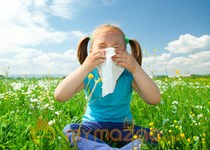Most of us may be enjoying the spring weather, but experts agree this year will be a rough one for allergy sufferers. And for parents who are looking to avoid over-the-counter drugs and all their potential side effects, herbal remedies might be a natural, alternative solution that may also be even more effective than conventional medicine.
In fact, a recent report from the Centers for Disease Control and Prevention (CDC) found that the most common complementary health approach for children ages 4 to 17 in 2012 were herbal remedies.
Although herbs are considered safe, they’re not regulated by the Food and Drug Administration (FDA). It’s a good idea to consult with a naturopathic doctor or an herbalist first, especially if your child is taking other medications or could be allergic to the herb itself.
Here, are 7 herbal remedies to help ease your child’s allergies.
1. Stinging nettle
A perennial wild plant, stinging nettle reduces inflammation and histamine production and is one of the best herbs for allergies, Dr. Patrick Fratellone, an integrative physician and an herbalist in New York City, said. Once the leaves are dried, simply soak them in boiling water to make a tea.
2. Quercetin
Quercetin is a bioflavonoid that reduces histamine from being released in the body and controls a running nose and itchy eyes. Quercetin is available as a supplement but one of the best ways to get it is through foods that have a white substance on the peel like oranges, tangerines and grapefruit.
“When a child has more allergies or allergy season is coming up, you want to give them more fruit that has those types of peels on it,” said Dr. Susanne Bennett, a holistic chiropractic physician in Santa Monica, Calif., best-selling author of "The 7-Day Allergy Makeover" and host of “Wellness for Life Radio” on RadioMD/iHeart Radio.
3. Ginger
Ginger is a powerful antioxidant and one of the most effective remedies to reduce inflammation in the respiratory tract caused by allergies. Try ginger candy or ginger root tea with some honey to make it more palatable.
4. Black currant
Black currant is a type of herbal medicine known as gemmotherapy, which uses plant stem cells to treat a condition and also acts as a natural cortisone to help alleviate inflammation and allergies, Bennett said.
5. Black elderberry
Black elderberry flowers can help to prevent viral infections and boost the immune system against viruses.
“Once your body is loaded with mucus and you’re congested all the time, that’s when all the bugs like to get there,” Bennett said.
Black elderberry is also effective at relieving coughs. Steep the flowers in boiling water and raw honey for three minutes.
6. Bilberry
The fruit and leaves of the bilberry plant, a perennial shrub that contains plant pigments, have super antioxidants as well as quercetin.
7. Pycnogenol
A pine bark extract, pycnogenol has antioxidant and anti-inflammatory properties and heals the mucus tissues in the eyes, nose, mouth and lungs.
Like the quercetin found in fruit, there are other foods that can relieve allergies. One is pineapple, because of the enzyme bromelain, which is anti-inflammatory.
“When you eat it— especially on an empty stomach— it cuts down the inflammation in the nose, lungs and eyes,” Bennett said.
Another food is bone broth because it soothes gut inflammation that can lead to allergies and boosts the immune system.
“Bone broth works to heal the actual membrane of the intestines because it is so high in calcium, phosphorus and many minerals, and because it is a ready source of collagen and gelatin, which are hard to get in supplements or food,” said Dr. Shauna Young, a certified traditional naturopath in Durango, Colo. and Chief Medical Advisor for The No Harm Foundation.










